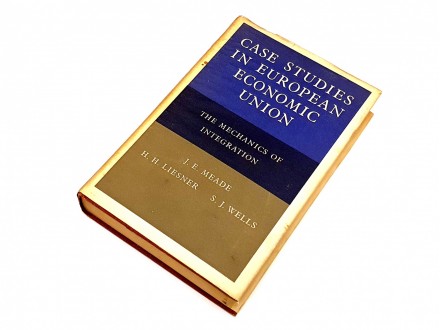Case Studies in European Economic Union
| Cena: |
| Želi ovaj predmet: | 4 |
| Stanje: | Polovan bez oštećenja |
| Garancija: | Ne |
| Isporuka: | BEX Pošta Post Express Lično preuzimanje |
| Plaćanje: | Tekući račun (pre slanja) PostNet (pre slanja) Ostalo (pre slanja) Lično |
| Grad: |
Novi Beograd, Beograd-Novi Beograd |
ISBN: Ostalo
Godina izdanja: 1962.
Oblast: Ekonomija
Jezik: Engleski
Autor: Strani
Case Studies in European Economic Union: The Mechanics of Integration / J. E. Meade, H. H. Liesner, S. J. Wells
London / Njujork / Toronto 1962. Tvrd povez, zaštitni omot, engleski jezik, tabele i grafikoni, 424 strane + mape.
Knjiga je odlično očuvana.
J11
This volume contains studies of the three European economic unions which already have a considerable historical experience to draw upon: thc Belgium-Luxembourg Economic Union, Benelux, and the European Coal and Steel Community. Thc book is not primarily concerned with the success or failure of these unions in increasing economic efficiency and raising standards of living. The purpose of the studies is rather to examine the mechanics of the construction of economic union. Can commercial unions be built without a unification of national tax policies or without a unification of monetary policies ? Can a partial union covering only some commodities (e.g. coal and steel) work effectively if it does not cover other closely related activities (e.g. transport) ? Can an economic union work effectively if wage rates are fixed on different principles in the member countries ? In an introduction to the studies Professor Meade comments on eleven main issues of this kind which are suggested by the actual experience of the three unions under study. Problems such as these are likely to be of great importance to the United Kingdom if she becomes a member of the European Economic Community.
Professor J. E. Meade is at present Professor of Political Economy in the University of Cambridge. He was a member and later Director of the Economic Section of the Cabinet Offices. His writings include The Theory of International Economic Policy (1951 and 1955), Problems of Economic Union (1953), and The Theory of Customs Unions (1955).
Mr Liesner has been a Fellow of Emmanuel College and a University Lecturer in Economics at Cambridge since 1959. He is the author of The Import Dependence of Britain and Western Germany (Princeton University Press, 1957); and is a regular contributor to the London and Cambridge Economic Bulletine
Dr S. J. Wells is a Lecturer in Economics at the University College of Wales, Aberystwyth, From 1958 to 1961 he was engaged on research at the Cambridge University Department of Applied Economicse
Sadržaj:
ABBREVIATIONS
INTRODUCTION
STUDY I: THE BELGIUM-LUXEMBOURG ECONOMIC UNION, 1921-1939
(1) Introduction; (2) The Basic Provisions of the Treaty of Economic Union; (3) The Administrative Machinery of the Union; (4) Belgium as the Predominant Partner; (5) Exceptions to the Principle of a Common Commercial Policy; (6) The Absence of Balance-of-Payments Restrictions within the Union; (7) Some Secondary Difficulties of Economic Integration; (8) The Agricultural Problem; (9) Luxembourg Wines; (10) The Taxation of Alcohol; (11) The Iron and Steel Industries; (12) The Luxembourg Railways; (13) Conclusion.
STUDY II: THE BUILDING OF BENELUX, 1943-1960
(1) Methods, Objectives, and Institutions; (2) The Customs Union; (3) The Unification of Indirect Taxation; (4) Direct Controls and the Organization of Industry; (5) Agriculture; (6) Shock Absorbers; (7) Financial Policies and the Balance of Payments; (8) The Movement of Capital and Labour;
(9) Public Contracts and Public Investment.
STUDY III: THE EUROPEAN COAL AND STEEL COMMUNITY
I INTRODUCTION
II PRICING AND COMPETITION
(1) Introduction; (2) The Treaty Provisions; (3) Price Controls in the Coal Market; (4) Differential Pricing; (5) Joint Buying and Selling of Coal; (6) The Recession in the Coal Industry; (7) Problems of the Steel Market; (8) The Scrap Market; (9) Concentrations.
III THE PROBLEMS OF THE BELGIAN COAL INDUSTRY
IV THE TAX ISSUE
(1) The Community and National Taxes; (2) Turnover Taxes; (3) Direct Company Taxes
V TRANSPORT IN THE COMMON MARKET
(1) Introduction; (2) Discriminatory Railway Rates; (3) Broken Freight Rates; (4) Special Railway Tariffs; (5) Harmonizing National Railway Rates; (6) Charges for Water Transport; (7) Road Haulage; (8) Summary.
VI COMMERCIAL POLICY
SELECT BIBLIOGRAPHY
INDEX
Predmet: 60830049







